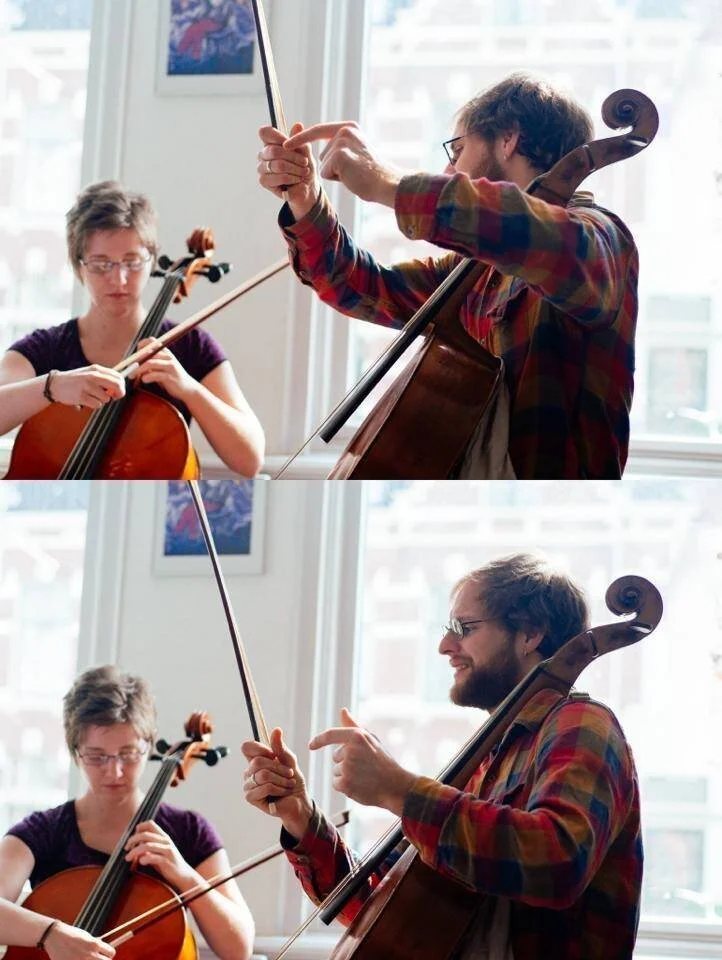
Lessons
Having established himself as one of the leading cellists of his generation, Steuart traveled the world playing in renowned concert halls and guest teaching at leading musical institutions and universities. He made the decision to return to his hometown in southwest Missouri to settle into a quieter life of teaching and farming. He now offers lessons in his barn to students of all levels (including adult professionals and amateurs), both in-person and online.
Read more about Steuart’s teaching experience and philosophy below, or click the “Open Form” button to send a message expressing your interest in lessons.
Steuart’s teaching experience….
Playing the cello is a craft that has been passed on by masters to their students for centuries. Steuart has studied with some of the masters of our day including Joel Krosnick, Darrett Adkins, and Catharina Meints, and when you study with Steuart, you enter into a distinct and rich tradition.
Steuart’s teaching experience ranges from working with young beginners to professional adults. Over the years, his students have gone on to attend leading music schools and conservatories as well as enjoy meaningful professional careers as chamber and orchestral musicians. He has served as Visiting Teacher at Oberlin Conservatory and has presented master classes and held residencies at community music schools, arts high schools, universities, and conservatories across the U.S. including Iowa University, Peabody Institute, Lawrence Conservatory, Wheaton Conservatory, Biola University, University of California Dominguez Hills, Missouri State University, Texas Tech University, Baylor University, and Gordon College. For 10 years he was on faculty at the Credo Music festival (teaching ages 13-23), taught for several years at the Crescendo Summer Institute in Hungary, and currently serves on faculty at the Texas Cello Festival.
… and his teaching philosophy
“My philosophy of teaching can be summed up quite simply. Any student I am teaching is a complex and beautiful being who I must carefully observe and listen to and consequently challenge and inspire. I am interested in developing the whole person. I strongly believe that the most wonderful and effective artists are those who have a meaningful life outside of their art form. A broad and flourishing life enhances the depth and diversity of the artist's resources for expression. I encourage all of my students to broaden their interests beyond music and use their musical gifting as a vehicle for communicating truth, goodness, and beauty in all areas of their lives!
To expand on my core philosophy, I have included below some specific elements of my own approach to teaching:
Imagination and Expression
I often encourage my students to begin their practice with a little time dedicated to improvisation (that is, after the necessary warm-up). Improvisation requires the exercise of the imagination and helps the student learn their most immediate forms of expression for particular emotions. When we start our practice with pre-written information (i.e. a piece or etude), there are more layers to interfere with pure expression. However, a regular practice of personal expression through improvisation helps the student connect the dots between what a composer requests and their most natural ability to expressively satisfy that request.
Although my focus in teaching is generally the standard cello repertoire, I believe that engaging in other disciplines is also essential for developing imagination and expression in a musician. I encourage my students to collaborate with other artists, musicians of non-Western specialty, as well as experts in other disciplines to expand their world of expression.
Technical and Musical Facility
Recognizing that playing the cello is already not the healthiest activity for our bodies, I am interested in helping students find the physically healthiest way to play the instrument that supports a mature and beautiful interpretation and presentation. Economy of motion is at the core of my technical teaching, but this is never at the expense of expressive gesture - all technique must serve musical expression!
A student must also be equipped with a strong musical and analytical facility. Students must be taught how to study a score, research the contextual background and respect the composer’s intent (insomuch as it can be understood). A constant and open dialogue between teacher and student on all such subjects is essential.
Individual and Collective
The musical development of the student should serve their growth as a human being. The teacher must consider the goals, interests and abilities of each individual. Peer review is also crucial for individual development. Playing for and with fellow students in performance scenarios and technical exercises helps each student strengthen and solidify their own artistic voice. Healthy competition, challenging verbal critique, and encouragement among students are essential to the individual’s health and growth.” - Steuart

